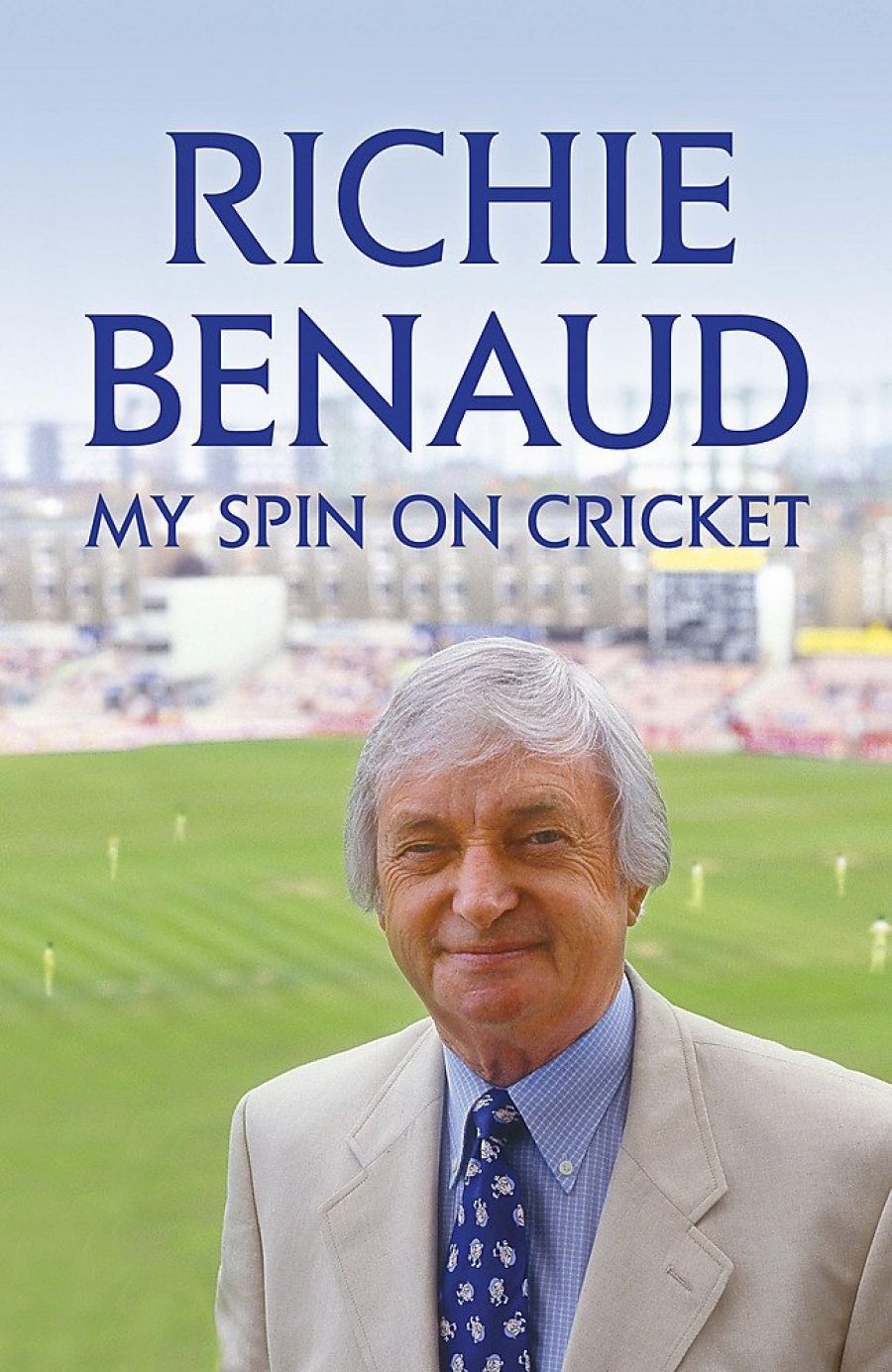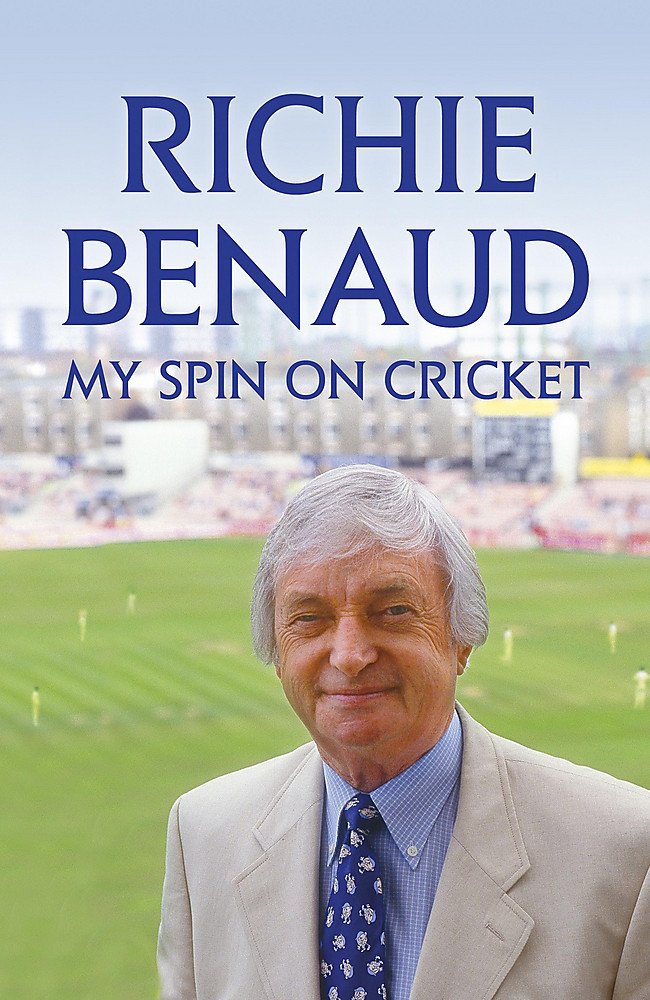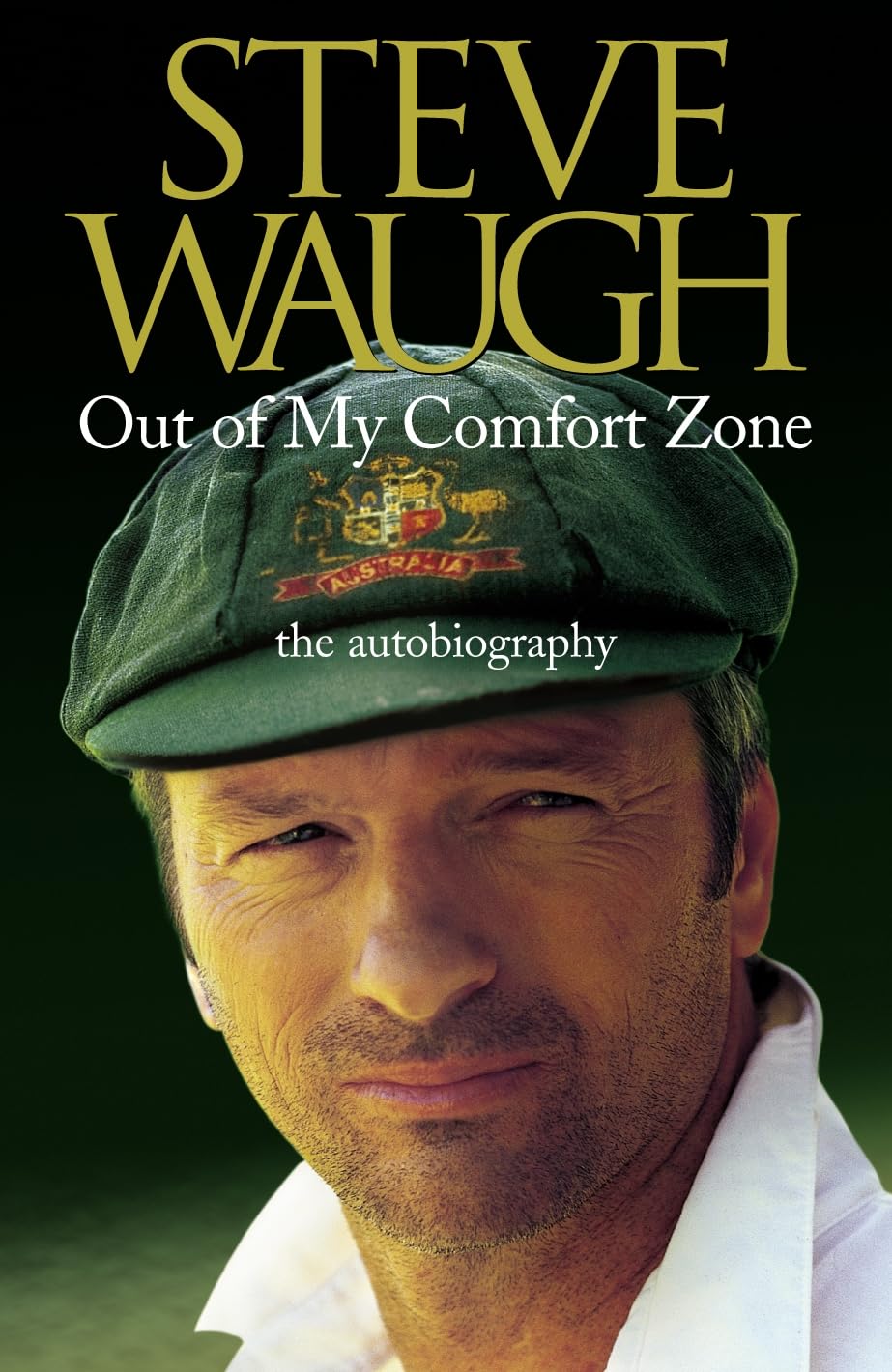
- Free Article: No
- Contents Category: Cricket
- Review Article: Yes
- Article Title: Many Zones
- Online Only: No
- Custom Highlight Text:
Like most professional sports men and women, Steve Waugh and his brother Mark were supported enthusiastically from the start by their parents. To begin with, enthusiasm was about all that Bev and Roger Waugh brought to the cricketing aspirations of their twin sons, with the result that their ‘very first official game of cricket [for Panania-East Hills Under 10s] was in many ways a disaster’. Mark and Stephen having made first and second ball ducks respectively, ‘wearing our only pad on the wrong leg and the placement (by our parents) of our protectors on our kneecaps’, was an embarrassment that was much harder to disown than zeros in the scorebook.
- Book 1 Title: My Spin On Cricket
- Book 1 Biblio: Hodder and Haughton, $45 hb, 279 pp, 0340833939
- Book 1 Cover Small (400 x 600):

- Book 1 Cover (800 x 1200):

- Book 2 Title: Out Of My Comfort Zone
- Book 2 Subtitle: The autobiography
- Book 2 Biblio: Viking, $49.95 hb, 764 pp, 067004198X
- Book 2 Cover Small (400 x 600):

- Book 2 Cover (800 x 1200):

The ‘comfort zone’ in the title of Steve Waugh’s new book is in fact many zones: the very business of writing at such personal and profound length and depth is one of these unfamiliar zones. Another is Waugh’s insistence, when on tour, on experiencing and not merely enduring foreign cultures. Not even the cricket field was necessarily always comfortable for Waugh, because it became his custom, more accurately his method, to seek and conquer extreme challenges. One of many great examples occurs during the Third Test in Trinidad, 1995: ‘one of those games you live for as a player,’ Waugh says – ‘a chance to slay the giant.’ Already labelled a ‘tief’ (thief) because of his controversial catching of Lara in the first Test, Waugh walks out to bat amid a barrage of abuse, and having received death threats in late-night phone calls. The famous confrontation with Curtly Ambrose ensues, in which Waugh is stunned to hear himself taunting the fast bowler – ‘a clear case of the mouth beating the brain to the punch’. In return, a furious bouncer crushes his top hand against the handle of the bat right in front of the face grill of the helmet. ‘I was a foot off the ground at the time of impact.’ It is characteristic of him that, while he recognises he is in for a torrid time, he nevertheless feels ‘an inner sensation that told me I was the guy to take them on’. Scarcely ‘comfortable’, but he courts the danger, conquers it, scraps, slogs, scampers and strokes his way to one of his best Test innings – sixty-three not out in a total of 128.
Waugh was a professional cricketer, so it is reasonable for this autobiography to be much consumed with his job – playing cricket. But, unlike so many slimmer works in this genre, Out of My Comfort Zone is no mere succession of match descriptions, highlights, lowlights and changing-room anecdotage. The central narrative is a complex one in which, among several themes, a continuing and highly sophisticated analysis of the stages in his psychological development as an élite sportsman is interwoven with often wonderful descriptions of matches and episodes in them. Because such examples inevitably bring other players into consideration, there are, within this structure, corollary examinations of success and failure which are acute, uncompromising and revealing. There is Greg Blewett, for example, in whom Waugh detects a technical flaw which produced ‘a rollercoaster of emotions and wayward form fluctuations that prevented stability’. Or the prodigiously gifted Michael Bevan, who asked Waugh for advice on playing the short ball but ‘who tinkered with his methods at the wrong time ... Sometimes as a cricketer you’ve got to know when to “stop and smell the coffee” and just enjoy your own game. Too much [self assessment] ... can arouse the monsters within that manipulate the mind and leave the inquirer muddled in his convictions.’ Bevan ‘got himself in a hell of a tangle over the short ball ... and after three Tests was shown the door by a ruthless selection panel’.
Waugh’s critiques of Blewett and Bevan come at a point in the book when we have already seen him afflicted by, and agonisingly triumphing over, precisely the same demons. His unwavering faith in his own capacity to prevail, and the iron will that conducts him through, constitute the unspoken difference between him and other, ostensibly similar or even in some cases more naturally talented players: ‘Lack of discipline and a lack of self-belief are two negatives that seem attracted to each other and end up using each other as crutches to lean on.’
Like a musical theme that sometimes swells, sometimes merely echoes, sometimes disappears only to reassert itself dramatically, surprisingly or shyly, Waugh’s single-minded application to the task of becoming a great cricketer – with all the nuances, vicissitudes, temptations (to celebrity, self-regard etc.), triumphs and satisfactions that this aim brought with it – is the organising preoccupation of the narrative. But this is a genuine autobiography and there is a different kind of life going on between games. Waugh describes with great affection and evocativeness his childhood, his early family life, his meeting with Lynette – the teenage sweetheart who would become his wife – and, above all, the trials, compensations, adjustments and compromises required to make marriage and fatherhood work through more than a decade when it was often difficult to see how serial absences could deepen fondness.
This is a wonderful, superior ‘cricket book’ – it is of course much more than that – because it is exhaustive, penetrating, painfully honest, philosophically and psychologically interesting and demanding. Like his batting, Waugh’s prose is, at its best, simple (remember his impeccable forward defence), at times elegant (remember the cuts), sometimes very tough (remember the slog sweep and taking the blows on the body). He is witty in an unpretentious way (in a form slump, runs are ‘harder to find than a television remote control’); he can be corrosively critical – of selection and selectors, and of cricket administration; and he has a fine touch with the satisfying, dramatic moment: coming face to face with Rashid Latif years after Latif had accused Waugh on his website of corruption during the betting scandal, Waugh responds to Latif’s polite on field greeting with: ‘Don’t you ever put that shit on your website again, or I’ll wrap this fucking bat around your head.’
Out of My Comfort Zone ends with an epilogue by Lynette Waugh, ‘My Life with Stephen’. This was a master-stroke. Her reference to, and quotation from, Nicholas Sparkes’s The Notebook, and the splendid concluding paragraph she conjures from it is intensely moving in a way that could not have been matched by Steve – or any husband.
Richie Benaud’s delightful My Spin on Cricket does not suffer by comparison, because comparison would be quite inappropriate. Like Waugh, though in a more muted way, Benaud is concerned to salute lovingly the role his wife, Daphne, has played in his cricketing life, but his book does not have, nor is it intended to have, the strong narrative drive of Waugh’s autobiography. My Spin on Cricket is a loosely connected collection of memories, reminiscences, observations and portraits drawn from the fifty-seven years Richie Benaud played, watched and commentated on cricket: ‘It’s a good lesson for everyone,’ he suggests, ‘that a youngster who throws a tennis ball up against a wall in a country town can still go on to captain his country at cricket ... It’s been a fortunate life and one that has been very much enjoyed.’
That note of recognising good fortune and enjoying it gives My Spin on Cricket its benign tone, its sense of richness and depth. Which is not to say that there is any lack of sharpness or punch. Many of the essays here are in the form of portraits – of individuals, of great innings, of memorable bowling performances – and all of them, as one would expect from a man of Benaud’s experience and acuity, are probing, revealing and appreciative in that charming yet authoritative way that Benaud long ago transferred effortlessly to the television screen.
With a scarcely visible change of gear, he can be uncompromisingly critical, as in his attack on the administrative vetoing of Sid Barnes’s selection for the 1951–52 series against the West Indies (to be placed, he suggests, in a file marked ‘Appalling’) and his graphic description of the 1994 Atherton ‘ball tampering’ incident (‘Has everyone in the cricket world gone bonkers?’ Benaud asked in the News of the World).
His anecdotes and opinions about commentating on television are particularly interesting since we can test his words against his own image and performance in the next room (as I write: day four of the Third Test, and Richie and Alan Davidson are reminiscing marvellously while the rain comes down). ‘Television,’ he remarks, ‘is instant, it is live and it is often very controversial, even dangerous.’ No doubt it is this kind of awareness that contributes to Benaud’s continuing flawless performance for Channel Nine, where his realisation of two great truths – that we in the television audience can see what’s happening too, and that those pictures will never be improved upon by an extempore spate of words – still has not especially impressed many of his colleagues.
I wish that, as a cricket lover, he had added to the treasures in this book his opinion on how advertising – between overs, when a wicket falls, across the bottom of the screen, and even between balls – affects the atmosphere and ambience of a game that is, in certain crucial ways, leisurely. Between overs, batsmen confer or worry, fields change, captains wave, point, converse: on television we see none of this. Our diet is slices, not good chunky serves. What do you reckon, Richie?
In My Spin on Cricket, Richie Benaud is thoroughly and confidently in his comfort zone, and it’s a great delight to encounter him there and to share it with him.


Comments powered by CComment